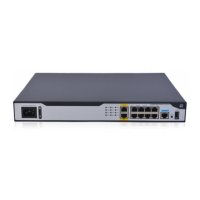261
Syntax
ipv6 import-route protocol [ process-id ] [ allow-ibgp ] [ allow-direct | cost cost | [ level-1 |
level-1-2 | level-2 ] | route-policy route-policy-name| tag tag ] *
undo ipv6 import-route protocol [ process-id ]
Default
IPv6 does not redistribute routes from any other routing protocol.
Views
IS-IS view
Predefined user roles
network-admin
Parameters
protocol: Redistributes routes from the specified routing protocol, which can be direct, static, ripng,
isisv6, bgp4+, or ospfv3.
process-id: Specifies a process by its ID in the range of 1 to 65535. It is available only when the
protocol is ripng, isisv6, or ospfv3.
allow-direct: Redistributes the networks of the local interfaces enabled with the specified routing
protocol. By default, the networks of the local interfaces are not redistributed. If you specify both the
allow-direct keyword and the route-policy route-policy-name option, make sure the if-match rule
defined in the routing policy does not conflict with the allow-direct keyword. For example, if you
specify the allow-direct keyword, do not configure the if-match route-type rule for the routing policy.
Otherwise, the allow-direct keyword does not take effect.
cost cost: Specifies a cost for redistributed routes, in the range of 0 to 4261412864.
level-1: Redistributes routes into the Level-1 routing table.
level-1-2: Redistributes routes into Level-1 and Level-2 routing tables.
level-2: Redistributes routes into the Level-2 routing table.
route-policy route-policy-name: Specifies a routing policy by its name, a case-sensitive string of 1 to
63 characters, to filter redistributed routes.
tag tag: Specifies an administrative tag for marking redistributed routes, in the range of 1 to
4294967295.
allow-ibgp: Allows redistribution of IBGP routes. This keyword is available only when the protocol is
bgp4+.
Usage guidelines
IPv6 IS-IS considers redistributed routes as AS-external routes.
You can specify a cost and a level for redistributed routes.

